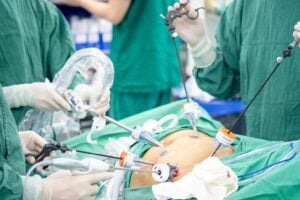Minimally Invasive Heart Surgery in Sugarland, TX
Your physician may recommend minimally invasive heart surgery if you have had one or more heart attacks, have a heart defect, or need heart valve repair. Unlike open-heart surgery, minimally invasive heart surgery uses a less invasive approach that results in less scarring, reduced pain, lower risk of complications, and faster recovery. At Reddy Cardiology, we have a team of experienced physicians and cardiologists with extensive experience diagnosing, evaluating, and treating cardiac issues. We can perform tests using state-of-the-art equipment and technology to determine if you are a good candidate for minimally invasive heart surgery in Sugarland, TX. Call us today to schedule a same-day appointment.
Understanding Minimally Invasive Heart Bypass Surgery
Minimally invasive heart surgery is a type of cardiac surgery that is performed by making small incisions in the chest. It is much less dangerous and invasive than open-heart surgery. A cardiac surgeon will use a small, powerful camera, surgical tools, or robotic arms to perform surgery through minor incisions. Using minimally invasive techniques can offer faster recovery times, less scarring, reduced pain, and a lower risk of complications than more invasive procedures.

When You Need Minimally Invasive Heart Surgery
Our team will run multiple diagnostic tests and procedures to determine if you need minimally invasive heart surgery. The results of these tests will allow us to make an official diagnosis of your condition, evaluate how far it has progressed, and determine the best possible treatment method. For the early stages of cardiac disease and other heart health issues, we will take a conservative, holistic approach to care. We will recommend lifestyle modification, weight loss, dietary changes, medication, and other conservative treatment options. However, for more serious or advanced conditions, we will recommend surgery. You may need minimally invasive heart surgery if you have:
- An atrial septal defect
- A patent foramen ovale
- An atrioventricular septal defect
- One or more heart attacks
- Atrial fibrillation
- Injury, disease, or damage to your heart valve
- Tumors in or around your heart
- An atrioventricular canal defect
- Coronary artery blockages
- Placement of a ventricular assist device
- Heart disease or heart failure
Types of Minimally Invasive Heart Surgery
There are two types of minimally invasive heart surgery: thoracoscopic surgery and robotically assisted heart surgery. The one you need will depend on your condition, its severity, your age, and your overall health:
- Thoracoscopic Surgery – This type of heart surgery involves making one or more small incisions on your chest. Your surgeon will insert a video camera (thoracoscope) through the incisions to visualize the heart. They use long, thin surgical tools to operate.
- Robotically-Assisted Heart Surgery – This type of heart surgery involves making multiple small incisions in your chest. Your surgeon will insert robotic arms through the incisions to visualize the heart and perform the surgery.
Benefits of Undergoing Minimally Invasive Surgery
Undergoing minimally invasive surgery offers many benefits over more invasive and dangerous procedures. When compared to open-heart surgery, minimally invasive heart surgery has:
- Less risk of blood loss
- Lower risk of infection
- Reduced pain
- Less scarring
- Reduced time with a breathing tube or ventilator
- Less time in the hospital
- Faster recovery time
- Lower risk of complications
Preparing for Minimally Invasive Heart Surgery
Before scheduling minimally invasive heart valve replacement surgery, our cardiologist will review what to expect before, during, and after the procedure. They will also go over the risks and benefits of the procedure. You may need to start or stop taking certain medications for two weeks or more prior to your surgery. You may also need to change your diet and get more exercise leading up to the surgery. In some cases, physical therapy can help you prepare before surgery so that you have better post-surgery results.
On the day of your procedure, you should wear loose, comfortable clothing. Do not wear contact lenses, jewelry, makeup, nail polish, perfume, deodorant, or any lotions or serums. Before surgery, you will also need to remove your eyeglasses and dentures. You may have hair shaved from some areas of your body. During the surgery, you will be under general anesthesia and also may be given an anti-anxiety medication. You will be connected to a heart-lung bypass machine. You will likely need to spend at least one night in the intensive care unit (ICU) after surgery. You will be administered fluids and oxygen and may wear a catheter. You will also have drainage tubes in your chest. After the first night, you will be moved to a standard hospital room where you will recover for a week or more. You will be encouraged to get up and walk around as soon as possible.
Schedule a Consultation With One of Our Cardiologists
At Reddy Cardiology, we are the premier cardiology center in Sugarland, TX. Our goal is to provide you with the most advanced and effective solutions for preventing or managing cardiovascular disease and other heart health issues. Our team of experienced physicians and cardiologists offers comprehensive testing using state-of-the-art equipment and technology, and we can diagnose, evaluate, and treat any cardiology issues. To learn more or schedule a consultation with one of our cardiologists, call us or contact us online.
Why Choose Us?
- Walk-In Patients Welcome
- Free Parking & Easy Access
- Accepting Most Insurance Plans
- Same Day Appointments Available
- State of the Art Facility & Equipment
- Extremely Friendly & Experienced Staff
